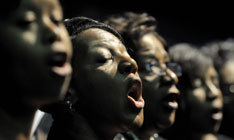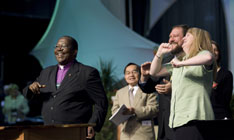A United Methodist bishop from Mozambique reminded the 2008 General Conference that deeds, not words, are the key to making true disciples who can transform the world.
In his morning sermon on April 25, Bishop João Somane Machado of the Mozambique Annual (regional) Conference said he was a product of the church's "great and glorious" missionary and evangelistic efforts to Africa in the 1950s, 1960s and 1970s. Just as much of Africa has been transformed by decades of work by followers of Christ, he told delegates to The United Methodist Church's top legislative assembly, so can the rest of the world be transformed.

Singers from Christ United Methodist Church, Baltimore, Md., lead worship. A UMNS photo by Paul Jeffrey.
Machado told of one missionary who came to Mozambique and was an agriculture expert. The missionary identified the widespread hunger in the region as a "beast" that needed to be killed, and went on to show the local residents what crops could be planted in each month of the year that would flourish and provide food. "He said which seeds to plant in the rainy season, and which to plant in the dry season."
Using the letter to the Galatians as his text, Machado said the Apostle Paul was asking the Christian community he had founded why it had stalled in its work of making disciples. "Paul is asking us, as The United Methodist Church, what has happened," Machado said. "You were running so well &ellipsis; what's the problem? There are no easy answers to that question."
"The three simple rules (of John Wesley) are very important in the life of the church. A world with hope is only possible when the church goes back to its principle mission of making disciples for the transformation of the world."
"But not just disciples," he continued, "we need true disciples. To transform the world we must be transformed ourselves." Referring to the "eloquent" messages presented to the General Conference on April 24, Machado told of a pastor sent to a church with the reputation for looking inward and not "out at the world."

Bishop João Somane Machado of Mozambique (left) joins in dancing following his April 25 sermon. With himis Marcia McFee, co-music director for the conference. A UMNS photo by Mike DuBose.
The pastor's opening sermon was very well received, but after he repeated the same message in the second and third weeks, the church administrative council asked why he was delivering the identical sermon. He responded: "Until you show me that you can put into action the words I am preaching, I'm not going to change my sermon."
During his 20 years as a bishop, Machado has seen "that the church is blessed with men and women, lay and clergy, with tremendous gifts and vitality. We need to do what we say &ellipsis; it's the actions we are missing."
The bishop opened with greetings in several languages-"all the languages spoken in heaven," he said-and then preached in his native Portuguese.
*Caldwell is editor of the Virginia United Methodist Advocate and a reporter for United Methodist News Service.
News media contact: Kathy Noble or Tim Tanton, e-mail: [email protected].
Phone calls can be made to the General Conference Newsroom in Fort Worth, Texas, at (817) 698-4405 (817) 698-4405 until May 3. Afterward, call United Methodist News Service in Nashville, Tenn., at (615) 742-5470
(817) 698-4405 until May 3. Afterward, call United Methodist News Service in Nashville, Tenn., at (615) 742-5470 (615) 742-5470.
(615) 742-5470.
Video
Bishop Joao Machado: "What happened that you stopped making disciples?"
Related Articles
General Conference headlines
Bishop played important role in bringing peace to Mozambique
Education is key to wiping out malaria in Mozambique
Resource
Like what you're reading? Support the ministry of UM News! Your support ensures the latest denominational news, dynamic stories and informative articles will continue to connect our global community. Make a tax-deductible donation at ResourceUMC.org/GiveUMCom.




